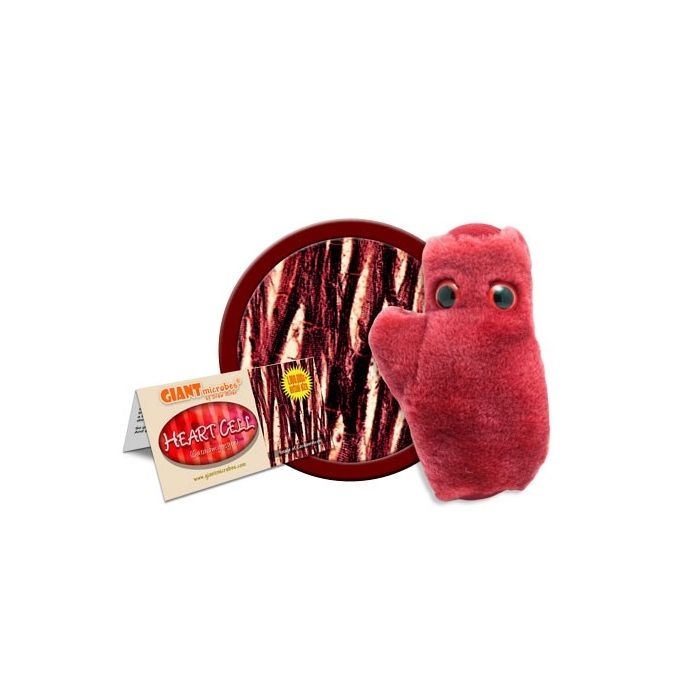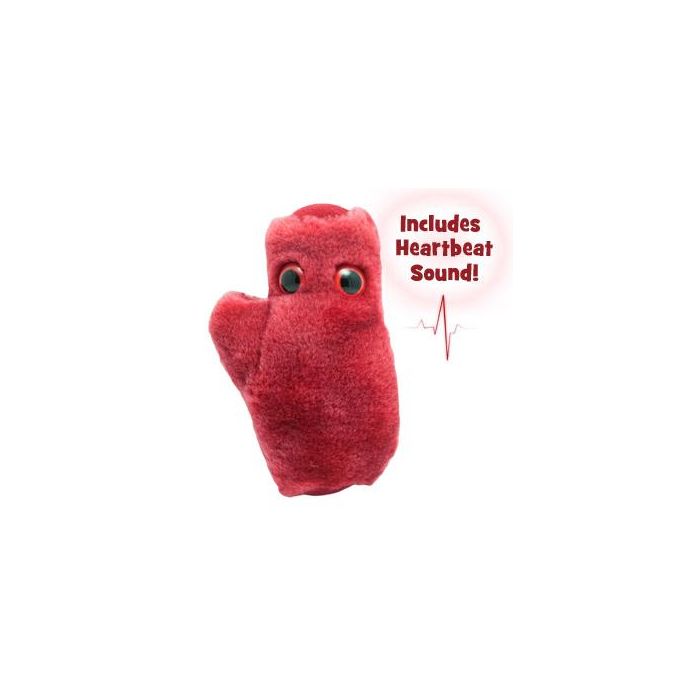Heart Cell (Cardiomyocyte)
Out of Stock
Product Details
Additional Information
| Sizes | Giantmicrobes are based on actual microbes, cells, organisms and other critters, only 1,000,000 times actual size! Gigantic (GG) 40-60cm XL (XL) 25-38cm Original (PD) 12-20cm Minis (MM) 5-10cm each Keychain (KC) 5-10cm with clip |
|---|---|
| Materials | Plush from all new materials. Stuffed with polyester fiber fill. Surface washable: sponge with water & soap, air dry. |
| Packaging | Each plush microbe includes a printed card with fun, educational and fascinating facts about the actual microbe or cell. |
| Safety | Every product meets or exceeds U.S. and European standards for safety. For ages 3 and up. |
All about Heart Cell (Cardiomyocyte)
FACTS: The heart is made of muscle cells which pump the body's blood throughout our lives from dawn to dusk and then from dusk to dawn. They function on their own and beat a steady rhythm by contracting and relaxing, though this automatic rhythm can be altered by the parasympathetic and the sympathetic nerves which can quicken the pace or slow it down again.
The cells are specially made to pump without a rest: abundant mitochondria and myoglobins help the cells to breathe, and coronary arteries bring lots of blood to feed the cells themselves (veins carry off the cells' digested waste) – unless, of course, the arteries are blocked and then the cells can die! (A heart attack, or myocardial infarction, then results.)
But in a normal healthy beating heart the cells are active once a second or a hundred thousand times a day, two billion times a life or more – the blood that’s pumped could make a river red.
It’s said the night sky has a thousand eyes, the day but one; but that the light of the world dies with the dying sun. It’s said the mind has a thousand eyes, the heart a single one; but that the light of living dies if ever loving’s done.
So guard your heart, with diligence, life’s well-spring from it flows. And give your heart to Truth alone, there shall your soul repose.
| Description | Cardiomyocytes are interlaced in order to form the heart muscle. Each cell typically contains 1 nucleus (some are multinucleated) and numerous mitochondria so that it has ample energy for contraction. The cells also contain myofibrils with are responsible for contraction. This is an adorable way to show your love for someone special as a Valentine’s Day gift! |
|---|
| Name | Cardiomyocyte comes from the parts: Cardio=heart and Myo= muscle Cyte= cell. |
|---|
| Actual Size | 0.02mm wide by 0.1mm long. 0.1mm is the thickness of a sheet of paper. |
|---|
| System | Circulatory System |
|---|
| Quantity | 2-3 billion cardiac muscle cells in the heart |
|---|
| Fascinating Facts | Slow Reproduction: Heart cells do not reproduce rapidly like other cells in the body. Cell division in the heart is immensely slow after birth. However, scientists are using hormones to manipulate cell growth so that the body can replace lost muscle after a heart attack. |
|---|





